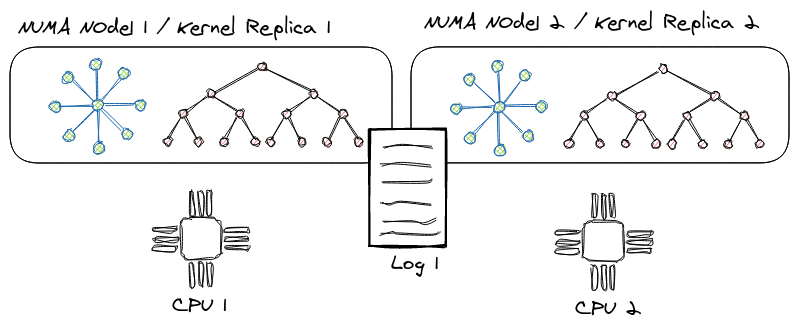Node Replicated Kernel?
Node Replicated Kernel (NRK) is a research prototype OS that started as a project at VMware Research, but is now being developed collaboratively by a team of researchers from industry and academia. It is intended as a basis to explore ideas about the structure of operating systems for hardware of the future. NRK is written from scratch, almost all in Rust (with some assembly), and it runs on x86 platforms.
How is NRK different from Linux, Windows, or MacOS?
At present, NRK lacks many of the features of an operating system that make it usable by anyone other than systems researchers taking measurements of the system itself. For example, there is currently no GUI or Shell, and only very limited application support. In fact, it's probably easier to compare NRK in it's current form to a light-weight hypervisor rather than a fully-featured OS.
From an architectural point of view, the NRK kernel is a new and practical implementation of a multi-kernel OS:
A multikernel operating system treats a multi-core machine as a network of independent cores, as if it were a distributed system. It does not assume shared memory but rather implements inter-process communications as message-passing.
Unfortunately, such a model also brings unnecessary complexity: For example, the "original" multi-kernel (Barrelfish) relied on per-core communication channels and distributed protocols (2PC, 1PC) to achieve agreement, replication and sharing in the OS.
We overcome this complexity in NRK by using logs: The kernel relies primarily on single-threaded data structures which are automatically replicated in the system. Various operation logs make sure the replicas are always synchronized. Our technique (called node-replication) bears resemblance to state machine replication in distributed systems, and lifts our single-threaded data-structures into linearizable, concurrent structures. Our OSDI'21 paper has more details on scenarios where this approach can heavily outperform the scalability of traditional lock-based or lock-free data-structures.

In user-space, NRK runs applications in ring 3: Each application can be understood as a single isolated process/container/lightweight VM with little opportunity to share state with other processes. To run existing, well-known applications like memcached, LevelDB or Redis, a process can link against rumpkernel, which instantiates and runs the NetBSD kernel and its user-space libraries (libc, libpthread etc.) within the process' address-space and therefore adds decent support for POSIX.
Finally, NRK is written from scratch in Rust: We take advantage of the use of a safe language with a rich type-system for OS implementation, to gain better security and correctness guarantees at compile time, while not impacting performance negatively.